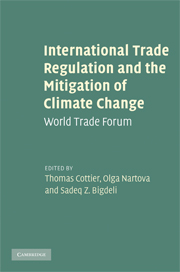Book contents
- Frontmatter
- Contents
- Contributors
- List of figures
- List of tables
- List of abbreviations
- Preface
- PART I Climate change mitigation: scientific, political and international and trade law perspectives
- PART II Climate change mitigation and trade in goods
- 5 How to think about PPMs (and climate change)
- 6 Tilting at conventional WTO wisdom
- 7 Private climate change standards and labelling schemes under the WTO Agreement on Technical Barriers to Trade
- PART III Trade in renewable energy sources
- PART IV Climate change mitigation and trade in services
- PART V Climate change and technology transfer, investment and government procurement: legal issues
- PART VI Institutional challenges and the way forward
- Index
5 - How to think about PPMs (and climate change)
from PART II - Climate change mitigation and trade in goods
Published online by Cambridge University Press: 04 August 2010
- Frontmatter
- Contents
- Contributors
- List of figures
- List of tables
- List of abbreviations
- Preface
- PART I Climate change mitigation: scientific, political and international and trade law perspectives
- PART II Climate change mitigation and trade in goods
- 5 How to think about PPMs (and climate change)
- 6 Tilting at conventional WTO wisdom
- 7 Private climate change standards and labelling schemes under the WTO Agreement on Technical Barriers to Trade
- PART III Trade in renewable energy sources
- PART IV Climate change mitigation and trade in services
- PART V Climate change and technology transfer, investment and government procurement: legal issues
- PART VI Institutional challenges and the way forward
- Index
Summary
Introduction
The European Commission has apparently backed off from a proposal to tax imported goods produced by methods that generate excessive greenhouse gas emissions. So the issue of whether such a tax would be legal under the WTO has become slightly less urgent than it recently appeared. But Pascal Lamy the Director-General of the WTO still thought the possibility of some countries imposing emission-based trade restrictions was worth mentioning prominently in his speech to the Trade Ministers Conference in conjunction with the Bali Conference on climate change after Kyoto. And at that same conference, an official of the European Commission may have indicated that such restrictions are not off the table entirely. Clearly, the impetus for such a tax to be levied by some nation or other is not going to go away until we have a universally accepted international regime for emissions control — which is to say, not any time soon.
Of course, as Lamy notes, there are all sorts of reasons to prefer a multilateral solution to the climate problem. Unilateral import restrictions based on emissions will be deeply resented by exporting countries. Unilateral restrictions are also likely to disrupt the economy of the importing country, if its supply chains and production have been globalised. Unilateral restrictions cannot in any event fully address the problem of high-emissions production when the products are sold in third-country markets (or in the home market of the high-emissions exporting country itself).
- Type
- Chapter
- Information
- International Trade Regulation and the Mitigation of Climate ChangeWorld Trade Forum, pp. 97 - 123Publisher: Cambridge University PressPrint publication year: 2009
- 4
- Cited by



